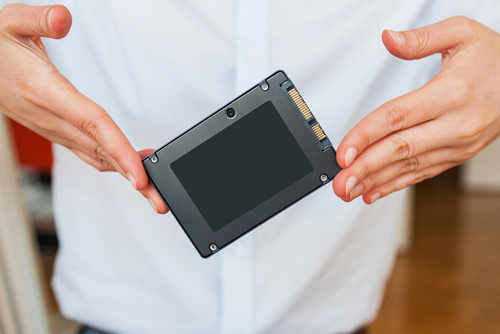The whole structure of your business website sits on the servers of your hosting provider. It is easy to imagine rows upon rows of servers lined up in a large, temperature-controlled room. Your site will be hosted on one such server that has either one of two types of hard disks: the kinds that have HDDs or those that have SSDs.
What are HDDs and SSDs?
HDD (Hard Disk Drives) are the kinds of disks you would normally find in your personal computer or laptop. The technology – which has been around for over 60 years now – uses a drive that has spinning platters that store data with the help of magnetism. That whirring sound you hear when your computer is working is an indication of its spinning as data is being accessed.
HDDs store, and access, data from the platters by moving round their central axis using a read/write head which is fixed to an arm that is used to access the data while the platters spin in the drive’s enclosure.
An SSD (Solid State Drive) on the other hand, has no moving parts. All data is stored on microchips. You can compare SSDs with your normal USB (thumb) drives – nothing moves when data is written on ore read from them. The basic difference between USB drives and SSD drives is the type of chips used and the speed of the processing and accessing of the data stored on them (with the advantage leaning towards the latter).
The data is stored on flash memory chips that save data even when the machine has been turned off. These chips can be installed as part of a computer’s (or server’s) motherboard, they can be put on PCI/PCIe cards or they can be slotted into the machines (as is most commonly done).
Advantages of HDDs and SSDs
The main advantage of HDDs is that they are cheap and are widely available for anyone to use. They are also very easy to expand to almost any size – at present there are capacities ranging from 500 GB to 4 TB.
The advantage of using SSDs lies in their very high performances. At present, they have the capability of accessing and serving data at a rate that is around 100 times faster than their HDD counterparts. They can also transfer data at a higher rate – to up to 5 times larger output than the HDDs.
Disadvantages of HDDs and SSDs
When compared to SSDs, HDDs perform at a much slower rate. One noticeable drawback of HDDs is that data is stored in different blocks of the disk’s surface – this is known as fragmentation. This is especially true when a large amount of data is involved or the disk has been in use for a long time – the data of files can be scattered across separate blocks; which makes it much harder for the data to be accessed as the search for sequential blocks takes time.
SSDs, on the other hand, have no issues with the fragmentation of data. But, they do cost a lot more than the HDDs. For example, a basic 120 GB SSD would cost around $100 while larger businesses could be asked to fork out around $3,500 for an 800 GB enterprise-sized storage. Right now, the largest size of SSD is limited to 4 TB – which is eye wateringly expensive.
Another drawback of SSDs is that, quite surprisingly, they have a relatively limited and shorter lifespan. SSDs have a tendency to wear out over time because each cell found in the flash memory bank has a limited number of times it can be written on and then erased. Of course, we are talking of very high usage as would be in the case of machines that are used for large media file access and serving – and even then, the users would need to be constantly accessing the files to wear the SSDs out.
SSD or HDD for your Business Website?
Well, now that we have the basic comparisons out of the way it’s time to decide which option is best for your business website.
When to go for HDDs: If you are a small business that is just starting out and do not have a large budget at your disposal, this is the better option for you. Similarly, if you don’t want to worry about the ease of expanding disk spaces – thus having an unlimited amount of storage at your disposal – this is, again, the better option for you.
When to go for SSDs: If your business has outgrown HDDs – like when you need superfast data access and you also have a larger budget to cover it – you should, by all means, choose hosting servers with SSDs (although when the hosting is shared the price does drop drastically – so you might get cheap hosting solutions if do your research well). You should also consider this option if your site has a database in the back or there are forums or chat engines attached to it – things that need quick read-write operations.




















